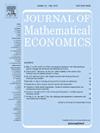Efficiency in multiple-type housing markets
IF 0.7
4区 经济学
Q3 ECONOMICS
引用次数: 0
Abstract
We consider multiple-type housing markets (Moulin, 1995), which extend Shapley and Scarf (1974)’s housing markets from one dimension to higher dimensions. In this model, Pareto efficiency is incompatible with individual rationality and strategy-proofness (Konishi et al., 2001). Therefore, we consider two weaker efficiency properties: coordinatewise efficiency and pairwise efficiency.
We show that these two properties both (i) are compatible with individual rationality and strategy-proofness, and (ii) help us to identify two specific mechanisms. Put precisely, on various preference domains, together with other well-studied properties (individual rationality, strategy-proofness, and non-bossiness), coordinatewise efficiency and pairwise efficiency respectively characterize two extensions of the top trading cycles mechanism (TTC): the coordinatewise TTC (cTTC) and the bundle TTC (bTTC). For multiple-type housing markets with strict preferences, our bTTC characterization constitutes the first characterization of a TTC extension.
Our proof is nonstandard and its novelty has independent methodological interest. Specifically, the absence of non-bossiness in the cTTC characterization and its presence in the bTTC characterization highlight both the uniqueness of our proof approach and the differences between our results and those in the existing literature.
多类型住房市场的效率
我们考虑多类型住房市场(Moulin, 1995),它将Shapley和Scarf(1974)的住房市场从一个维度扩展到更高维度。在该模型中,帕累托效率与个体理性和策略正确性不相容(Konishi et al., 2001)。因此,我们考虑两个较弱的效率性质:协调效率和成对效率。我们表明,这两个属性都(i)与个人理性和策略证明相容,并且(ii)帮助我们确定两个特定的机制。准确地说,在不同的偏好领域,以及其他被充分研究的属性(个人理性、策略验证性和非主体性),协调效率和配对效率分别表征了顶部交易周期机制(TTC)的两个延伸:协调TTC (cTTC)和捆绑TTC (bTTC)。对于具有严格偏好的多类型住房市场,我们的bTTC表征构成了TTC扩展的第一个表征。我们的证明是非标准的,其新颖性具有独立的方法论意义。具体来说,cTTC表征中没有非老板性,而bTTC表征中也有非老板性,这既突出了我们证明方法的独特性,也突出了我们的结果与现有文献之间的差异。
本文章由计算机程序翻译,如有差异,请以英文原文为准。
求助全文
约1分钟内获得全文
求助全文
来源期刊

Journal of Mathematical Economics
管理科学-数学跨学科应用
CiteScore
1.70
自引率
7.70%
发文量
73
审稿时长
12.5 weeks
期刊介绍:
The primary objective of the Journal is to provide a forum for work in economic theory which expresses economic ideas using formal mathematical reasoning. For work to add to this primary objective, it is not sufficient that the mathematical reasoning be new and correct. The work must have real economic content. The economic ideas must be interesting and important. These ideas may pertain to any field of economics or any school of economic thought.
 求助内容:
求助内容: 应助结果提醒方式:
应助结果提醒方式:


